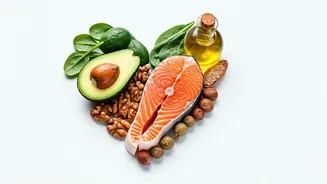Understanding Cholesterol Levels
Cholesterol, a waxy substance, is essential for various bodily functions, including hormone production and cell structure. However, an imbalance of cholesterol,
particularly high levels of low-density lipoprotein (LDL) or 'bad cholesterol', can elevate the risk of heart disease. Conversely, high-density lipoprotein (HDL), often referred to as 'good cholesterol', plays a protective role by removing LDL cholesterol from the arteries, reducing the likelihood of plaque buildup and promoting cardiovascular health. Maintaining a healthy balance is crucial for long-term well-being. Regular monitoring of cholesterol levels through blood tests and adopting lifestyle adjustments like dietary changes and exercise can significantly contribute to optimal heart health. Focusing on increasing HDL and lowering LDL is a fundamental approach to safeguarding your heart.
Olive Oil's Heart Benefits
Olive oil, especially extra virgin olive oil, is a cornerstone of the Mediterranean diet, renowned for its heart-healthy benefits. Rich in monounsaturated fats, olive oil helps reduce LDL cholesterol while increasing HDL cholesterol levels. Studies show that regular consumption of olive oil can significantly lower the risk of heart disease and stroke. Its antioxidant properties, derived from compounds like oleocanthal, also contribute to reducing inflammation, a key factor in heart disease. Incorporating olive oil into your diet is straightforward. Use it as a salad dressing, drizzle it over vegetables, or cook with it at low to moderate temperatures. Choosing high-quality olive oil ensures you receive the most health benefits, making it a flavorful and effective way to support cardiovascular health.
Avocados for HDL Boost
Avocados are another excellent source of monounsaturated fats, essential for boosting HDL cholesterol. They also contain fiber, which aids in lowering LDL cholesterol and improving overall heart health. Research indicates that avocados can help reduce total cholesterol levels and improve blood lipid profiles. This creamy fruit is packed with nutrients, including vitamins, minerals, and antioxidants, which contribute to overall health and wellness. Avocados are versatile and can be enjoyed in various ways: sliced in salads, mashed into guacamole, or added to smoothies. Their creamy texture and mild flavor make them a delicious and healthy addition to any diet. Including avocados in your daily meals provides a significant boost to your HDL levels and supports a healthy heart.
Nuts and Seeds Power
Nuts and seeds, such as almonds, walnuts, flaxseeds, and chia seeds, are packed with healthy fats, fiber, and plant sterols, which can increase HDL cholesterol and reduce LDL cholesterol. Almonds and walnuts, in particular, are rich in monounsaturated and polyunsaturated fats, known to improve cholesterol levels. Flaxseeds and chia seeds are excellent sources of omega-3 fatty acids and fiber, both crucial for heart health. Studies show that regularly consuming a handful of nuts or seeds can improve cholesterol profiles and reduce the risk of heart disease. Incorporate nuts and seeds into your diet by adding them to your breakfast cereal, salads, or yogurt. They also make a great snack. Make sure to consume in moderation due to their high-calorie content, but their heart-healthy benefits are well worth the effort.
Fatty Fish and Omega-3s
Fatty fish, including salmon, mackerel, and sardines, are rich in omega-3 fatty acids, particularly EPA and DHA, known for raising HDL cholesterol and lowering triglycerides. Omega-3s are also known for reducing inflammation and supporting overall cardiovascular health. The American Heart Association recommends consuming at least two servings of fatty fish per week to benefit from these health-promoting fats. Studies demonstrate that regular consumption of fatty fish can reduce the risk of heart disease and stroke. Grilled, baked, or pan-seared, fatty fish offers a delicious and healthy meal option. If you do not like fish, you can also consider taking omega-3 supplements, but consult with your doctor first. Including fatty fish in your diet is a powerful way to improve your HDL levels and support a healthy heart.
Whole Grains for Wellness
Whole grains, such as oats, brown rice, and quinoa, are rich in soluble fiber, which helps lower LDL cholesterol and improve overall cholesterol profiles. Soluble fiber binds with cholesterol in the digestive system and prevents its absorption, which contributes to increased HDL levels. These grains also provide essential nutrients and contribute to a feeling of fullness, which can help control weight, another factor in heart health. Choosing whole-grain options over refined grains is a simple dietary adjustment with significant health benefits. You can start your day with oatmeal, use brown rice instead of white rice, or add quinoa to your salads. These grains not only support healthy cholesterol levels but also provide sustainable energy and promote overall well-being. This approach helps increase your HDL and bolsters the health of your heart.
Beans and Legumes
Beans and legumes, including lentils, chickpeas, and kidney beans, are excellent sources of soluble fiber, which helps reduce LDL cholesterol. They are also rich in plant-based protein, which contributes to heart health. Research suggests that regularly consuming beans and legumes can improve cholesterol levels and reduce the risk of heart disease. Their low glycemic index also helps in controlling blood sugar levels, contributing to overall cardiovascular health. Beans and legumes are versatile and can be incorporated into various meals. Add them to soups, stews, salads, or enjoy them as a side dish. These foods are a great way to boost your HDL levels and support heart health, providing valuable nutrients and fiber that contribute to overall wellness. Making beans and legumes a regular part of your diet will benefit your heart health.






















